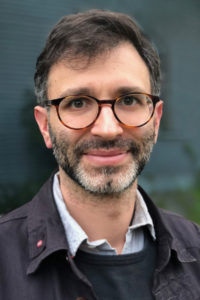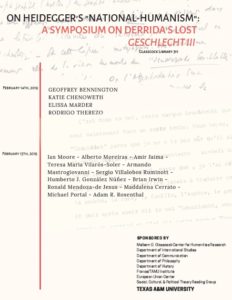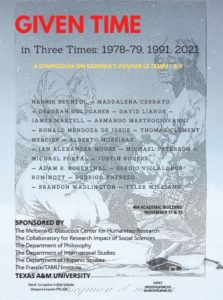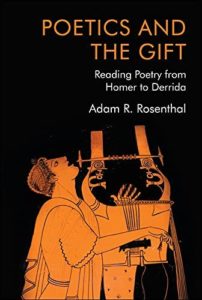Illuminating Humanities: Adam Rosenthal
Highlighting Humanities Research and its Impact
Adam Rosenthal | Global Languages & Cultures

Dr. Adam Rosenthal, Assistant Professor, Global Languages & Cultures, Texas A&M
The Glasscock Center is excited to continue its series which highlights humanities research at Texas A&M, and the vital role played by the humanities at the university and in the world beyond the academy.
For this highlight, we invite Dr. Adam Rosenthal to tell us about his previous symposia supported by the Glasscock Center (2019, 2021) and the resulting publications in Politica comun and Derrida Today.
Tell us a bit about your previous symposia supported by the Glasscock Center and the resulting publications.
The Glasscock has been extremely generous when supporting events that I’ve tried to put on at Texas A&M. The two I’ve organized, “On Heidegger’s ‘National-Humanism’” (2019) and then “Given Time in Three Times: 1978-79, 1991, 2021” (2021, co-organized by Michael Portal in Philosophy) each centered on what were, at the time, recently published, posthumous texts, written by the French philosopher Jacques Derrida (1930-2004). During his life, Derrida was best known among poststructuralist thinkers for his work on “deconstruction”: a way of reading and mode of critical analysis that challenges established binaries, and which gained notoriety above all through books such as Of Grammatology (1967) and Specters of Marx (1993). The events that I’ve hosted, in contrast to these well-known texts, have each focused on texts that Derrida wrote not for publication, but for the seminars that he regularly taught in France and the US. They therefore reveal a very different side of his thinking: one grounded in his pedagogy. This is an element of Derrida’s intellectual life that scholars have only recently begun addressing, since around 2008, when the first volume of The Beast and the Sovereign, Derrida’s final seminar, was published.
Both of the events I organized, in 2019 and 2021, featured presentations by graduate students and faculty from TAMU, as well as by scholars from universities such as Louisiana State, Emory, Princeton, and Michigan. The excellent quality of the papers has made it extremely easy to find venues for publication. Following the 2019 symposium, with the help of Gareth Williams and Alberto Moreiras, we were able to publish a selection of the papers in a special issue of the journal Política Común. More recently, with Nicole Anderson’s support, a double issue of the journal Derrida Today is coming together, with papers presented at the 2021 event as well as a couple of original texts by Derrida himself that have never before been published in English. I, along with Michael Portal, who is co-editing those issues of Derrida Today with me, are very excited for this, which should appear in print sometime in 2023.

"On Heidegger’s ‘National-Humanism’" (2019) Event Poster

"Given Time in Three Times: 1978-79, 1991, 2021" (2021) Event Poster, Co-organized by Michael Portal, Philosophy
What inspired your interest in this topic, and why is it significant?

Rosenthal's recent publication, Poetics and the Gift: Reading Poetry from Homer to Derrida (Edinburgh University Press, 2022)
A lot of my research over the last decade has been inspired by topics initially explored by Derrida. This is true not only of the two symposia I’ve hosted, but also of a special issue of the journal Poetics Today that I edited in 2021, “Derrida’s Classroom” (42.1), and my recently published book, Poetics and the Gift: Reading Poetry from Homer to Derrida (Edinburgh University Press, 2022). (I should mention that essential elements of both projects were also funded by grants from the Glasscock, grants for which I remain extremely grateful!)
The symposium in 2021 was animated by the recent discovery, and subsequent publication, of the French edition to the second volume of Given Time 1: Counterfeit Money. Given Time had initially been published in 1991 and, at that time, it made a huge splash. This was Derrida’s first sustained effort to answer questions such as: what is a “gift”? what does it mean “to give”? These are questions that, at first glance, seem easy, but that ultimately concern deep and difficult questions about the nature of economics, community, and shared experience. Notoriously, Given Time departed from a lot of the common assumptions made at that time by sociological and anthropological approaches to gift giving. Where sociologists such as Marcel Mauss and Pierre Bourdieu had contended that gift giving functions as a form of concealed exchange—whereby one is obliged by the receipt of a gift to make a return at a later date—Derrida, by contrast, writing in 1991, argued that any gift that would be returned in this way was in fact no gift at all. The gift, he argued, the very word as well as the experience of giving, implies a form of non-return, or excess, that can never actually be realized in an exchange between two (or more) people.
If Derrida is right, then he forces us to reconceptualize what “to give” means. For me, what is important in all this is the recognition that “giving,” the experience of “giving,” concerns something fundamentally inarticulable by the language of economics and exchange. The point is not that the gifts we give each other, insofar as we feel bound or indebted by them (for example, in the experience of gratitude), are somehow invalid. No, the point is that what we say and do when we give, concerns something more than the gratitude (or counter-gifts) that we receive in return. Gifts provoke experiences of the incalculable, of surprise, of what Derrida would call “the impossible.” Anyone who has seen children at Christmas must know this! To be surprised by a gift from the other is to be overtaken (this is, quite literally, what sur-prise means). It is to be overwhelmed by an experience that falls outside of one’s horizon of expectations. That’s why, instead of a matter of concealed exchange and calculation, Derrida opts to understand gifts as “impossible,” which is to say, as arriving as that which cannot be anticipated, or counted on. (There are close links here to what one commonly understands by the term “miracle.”)
Anyway—and I apologize for the long-winded response!—I found this idea completely transfixing when I first encountered it. To a great extent, I still do today! And though it all sounds a bit outrageous at first, the implications of this thought turn out to be rather straightforward: if gift-giving can’t be understood in terms of exchanges, then we need to think something other than calculation and economy. If the experience of surprise (and the gift) is about the impossible, then maybe we need to revisit how we think of “possibility,” in the first place? Maybe “possibility” doesn’t describe everything that is (or can be), but is instead only a restricted representation that is constantly being penetrated, if only we are willing to bear witness to it.
So, there are widespread implications to this thought! Both for economics, politics, ethics, and experience. The second volume to Given Time expands on everything I’ve just said and brings the argument to bear on the works of Martin Heidegger, Immanuel Kant, Edmund Husserl, and Maurice Blanchot.
What did you find rewarding in your work?
I like to explain things. Whether it’s a matter of the mundane, such as everyday elements of contemporary life, or more abstract problems, such as the relationship between possibility and impossibility, or the limit between the living and nonliving, conceptual clarification is, to me, an extremely critical project that can hold great rewards. But it’s also important—and this, to my mind, is one of the principal functions of the humanities and social sciences, to say nothing of the sciences—it’s also important not to recoil from the difficulties that one encounters in explanation. In other words, sometimes what one learns through extended investigating of a problem is, precisely, that straightforward conceptual elaboration is impossible! It is our responsibility, as educators and scholars, not only to strive for the most rigorous and clear forms of explanation possible, in our encounters with complex problems, but also, where necessary, to acknowledge the dead ends, blind spots, and paradoxes that are encountered through such investigation. The rigor of explanation can lead one to realize that straightforward explanation is impossible. But the impossibility of such explanation isn’t a failure. It is, itself, the sign of a kind of rigor that humanistic inquiry is perhaps the most adept to respond to. Indeed, I’d even be tempted to call it another kind of “fact,” and one that we shouldn’t shy away from.
Why are the humanities and humanistic social sciences important to society as well as to you personally, especially in the current moment?
I think that I started to answer this question above, so I would simply add that: We need the humanities, humanistic social sciences, and the sciences, because each offers a diversity of methodological approaches not otherwise modeled by the others. Why is this “diversity” necessary? It’s necessary because the forms of explanation that one finds, for example, in the sciences, remain incomplete, so long as they are unreflective of the ways that culture, language, history, race, gender, etc. already inform their pursuits. When I think of what is so important in the work, let’s say, of Donna Haraway, it’s how she brings out the co-implication of “empirical” research into microbiology, anthropology, and climate science, with the “fictions” (or “cultural artifacts”) that are necessarily produced by any discourse that remains thoroughly linguistic and historical. So, if the humanities and humanistic social sciences are perhaps more sensitive to the linguistic, historical, and cultural elements that pervade our world (indeed, that pervade every possible world!), well, then, this sensitivity needs to be brought into constant conversation with the corresponding insights of more empirically-directed fields, which often have an incredible mastery over highly sophisticated and highly technical problems, but sometimes lack sensitivity to the histories and meanings of the very concepts that they employ. No discipline can do everything. The very notion of a “discipline” implies this separation and specialization, but not, of course, in a total or absolute way. This is why different disciplines must converse. When they don’t, it’s to the detriment of all.
The difficulty that the sciences have with naming (like naming species, or epochs, etc.) is one area where the co-implication of the empirical and the cultural is very apparent. Naming is always a cultural as well as political—to say nothing of poetic!—act. Scientific nomenclature has massive ramifications both beyond and within science. Calling the “Anthropocene” the “Anthropocene” has vast implications, just as organizing taxonomies according to physiology (as opposed to genetic ancestry) does. Scientists, to the extent that they classify and name, are no less poets than they are scientists! The point, though, is that disciplines that have developed sophisticated languages and conceptualities for thinking about “linguistic” and “cultural” problems, have a very particular rigor, all their own, that is not readily available in disciplines that are traditionally dedicated to analyzing strictly “physical,” “biological,” or “informational” systems. But we need both! And maybe we need some new disciplines, as well, that are equally invested in the one and the other!

Besides your work, what is something you are passionate about?
I’m a novice woodworker, which is good because it teaches you that there are no straight lines. But I’m also pretty passionate about the Philadelphia 76ers.
What are some future research projects that you are, or want to, work on?
Well, I’ve just finished writing a book about immortality, but it’s not what you think! I’m neither a partisan nor a believer in never-ending life. Rather, I was inspired by a strange coherence that I encountered, between different discourses that appeal to the language of immortality, both in the sciences and in popular culture.
Since the days of Homer, poets have lauded their poems because they promised a form of immortality to those whom they inscribed in their works. This is an immortality of the “name,” through which, the thinking goes, a part or portion (however meager) of the self is preserved (ideally, forever). Recently, a ragtag group of tech moguls, STEM professionals, and philosophers, generally known as “transhumanists,” have promised different forms of digital immortality, notably through what is called “brain uploading.” If the strange symmetry between classical poets and tech futurists wasn’t enough, within the life sciences, “biological immortality” generally refers to clonal forms of propagation, in which there is a continuity of the germline, without visible “loss” of individual cells. What does that mean? Well, when a bacterium reproduces through fission, where there was one bacterium, now there are two. But because there is no obvious loss of life in this division—only a duplication that in turn duplicates—well, according to the biologists, this is also a “form” of immortality.
So, what, if any, continuity is there between each of these conceptions and how, if at all, do any of these examples relate to what is commonly referred to as “immortality,” above all in the Christian vision of the eternal afterlife of the soul?
Well, answering these questions is the task that I set for myself in Prosthetic Immortalities: Deconstruction, Biology, Transhumanism and the Promise of Indefinite Life. Since drafting the book, I’ve become obsessed with the question of life more broadly, and am now undertaking a number of cross-disciplinary projects that broach this problem from a diversity of angles, both in the humanities and in the sciences.

To read Adam Rosenthal's recent debate, "Who Wants To Live... Indefinitely? Transhumanism, Biology, and Our Biotechnological Present," click here.
